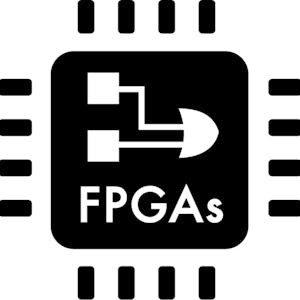FPGA Capstone Building FPGA Projects
This course will give you hands-on FPGA design experience that uses all the concepts and skills you have developed up to now. You will need to purchase a DE10-Lite development kit. You will setup and test the MAX10 DE10-Lite board using the FPGA design tool Quartus Prime and the System Builder.You will:
Design and test a Binary Coded Decimal Adder.
Design and test a PWM Circuit, with verification by simulation.
Design and test an ADC circuit, using Quartus Prime built-in tools to verify your circuit design.
Create hardware for the NIOS II soft processor, including many interfaces, using Qsys (Platform Designer). Instantiate this design into a top-level DE10-Lite HDL file.
Compile your completed hardware using Quartus Prime.
Enhance and test a working design, using most aspects of the Quartus Prime Design Flow and the NIOS II Software Build Tools (SBT) for Eclipse.
Create software for the NIOS II soft processor, including many interfaces, using Qsys (Platform Designer) and the SBT.
Compile your completed software using the SBT.
Use Quartus Prime to program both the FPGA hardware configuration and software code in you DE10-Lite development kit.
Record all your observations in a lab notebook pdf.
Submit your project files and lab notebook for grading.
This course consists of 4 modules, approximately 1 per week for 4 weeks. Each module will include an hour or less of video lectures, plus reading assignments, discussion prompts, and project assignment that involves creating hardware and/or software in the FPGA.
Create a working FPGA design using Quartus Prime and run it on an evaluation board
Understand and practice all aspects of FPGA development, including conception, design, implementation, and debugging.
Create in the FPGA a working system on a chip design with Nios II soft processor, RAM and FLASH memory, and several peripherals.
Become familiar with the FGPA development flow, particularly in the case of a SoC with software development flow included.
Syllabus
Syllabus - What you will learn from this course
Week 1
Hands on: Altera MAX10 Hardware Setup
Week 2
Develop a Mixed Signal System
Week 3
Create a System on a Chip with NIOS II
Week 4
Software for a System on a Chip
FAQ
When will I have access to the lectures and assignments?
Access to lectures and assignments depends on your type of enrollment. If you take a course in audit mode, you will be able to see most course materials for free. To access graded assignments and to earn a Certificate, you will need to purchase the Certificate experience, during or after your audit. If you don't see the audit option:
The course may not offer an audit option. You can try a Free Trial instead, or apply for Financial Aid.
The course may offer 'Full Course, No Certificate' instead. This option lets you see all course materials, submit required assessments, and get a final grade. This also means that you will not be able to purchase a Certificate experience.
What will I get if I subscribe to this Specialization?
When you enroll in the course, you get access to all of the courses in the Specialization, and you earn a certificate when you complete the work. Your electronic Certificate will be added to your Accomplishments page - from there, you can print your Certificate or add it to your LinkedIn profile. If you only want to read and view the course content, you can audit the course for free.
Is financial aid available?
Yes. In select learning programs, you can apply for financial aid or a scholarship if you can’t afford the enrollment fee. If fin aid or scholarship is available for your learning program selection, you’ll find a link to apply on the description page.
Reviews
In general a good course structure and content. It lacks support on question and exercises.
Requires knowledge of FPGA design flow (make sure to take 3 courses before this one), great practical tasks that complete the whole specialization.
This specialization has a very good balance between deepness and breadth of transmitted knowledge. Thank you !
Excellent integration of all the knowledge aquired in the previous courses.
